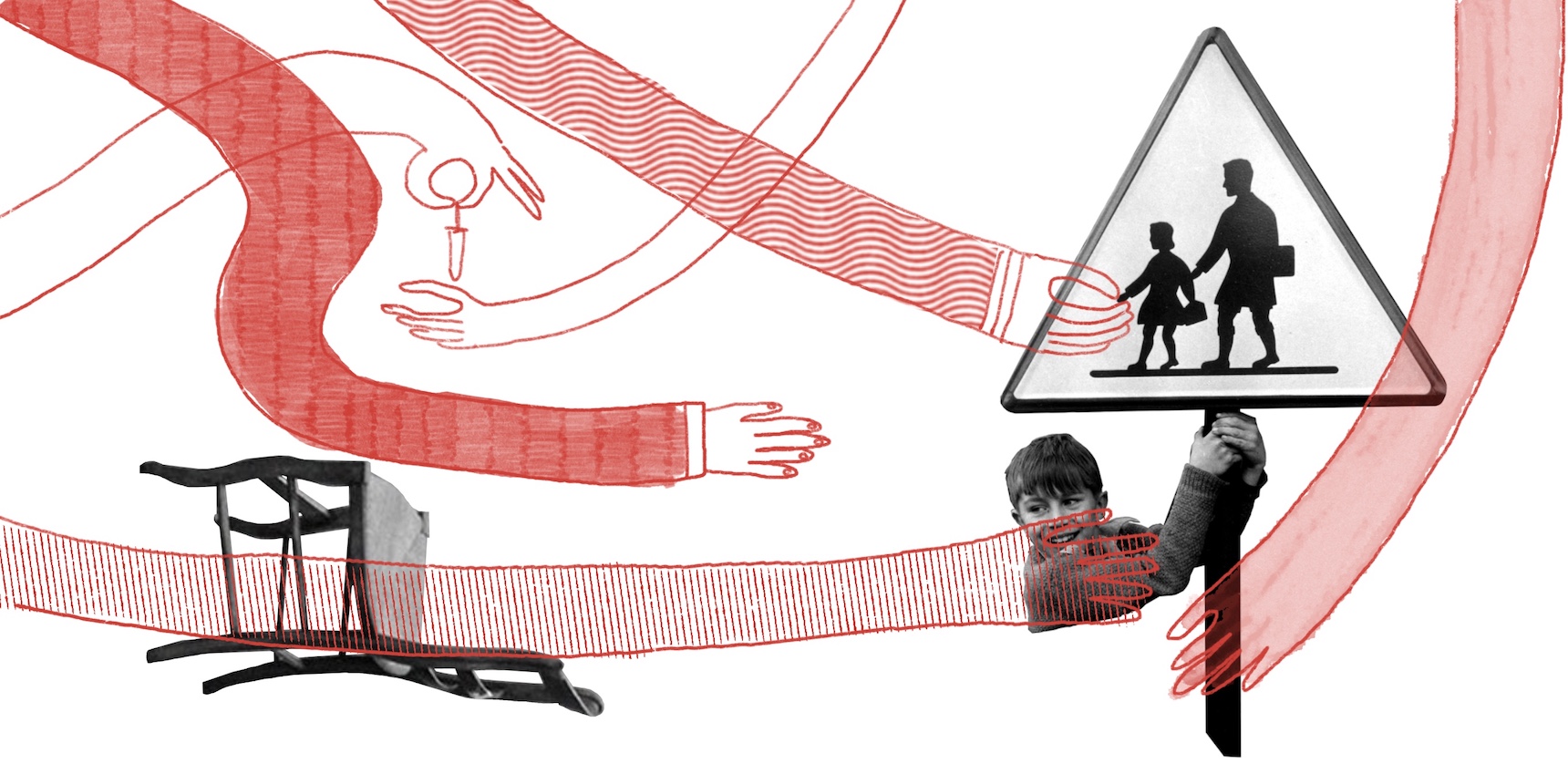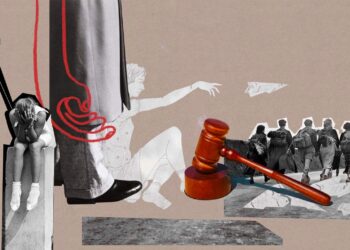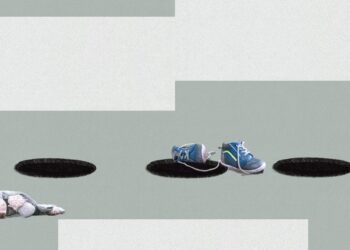
In the girls’ quarter at the Zatik Child Assistance Center, two children are lying in the same bed. They occasionally raise their roughly shorn heads and look around fearfully. The previous evening, when they arrived at the center, no one asked their names. It wasn’t until they were given baths was it discovered that they were both boys. Because there were no beds available in the boys’ rooms, they were placed in with the girls.
The children will now have to learn to live a communal life, where there are only six cups for 14 children, and the bathroom doors do not lock.
The Zatik Child Assistance Center in Yerevan is a crisis center, an intermediate link in social services for children who find themselves in challenging life situations. They stay in the institution for only a few months, while it is being determined if they can return to their families or should be moved to another institution. The children who are housed at Zatik are often subjected to physical, psychological and sexual violence; they are overcome with anxiety and an acute awareness of being defenseless, and thoughts of self-harm not uncommon.
These are the findings of the monitoring group comprised of representatives of several NGOs, operating under the Ministry of Labor and Social Affairs, tasked with monitoring state residential care institutions in Armenia that house children, the elderly and people with disabilities. The monitoring group’s Urgent Report, published following their unannounced visit on March 29, 2023, to the facility, raises red flags, attesting that what they witnessed at the Zatik was the most appalling yet.
“The boys and girls here fight 24 hours a day. Specialists hardly come and when they do, they just drink coffee and then leave,” the report quotes one of the residents as saying. “We don’t want to talk to any of them. Children here know that if they have a problem, no one will help them. Here they push the children to the point that they want to kill and harm themselves. If they don’t want to commit suicide, they run away from the center, but then end up in jail.”
In the report, the children and the employees of the center discuss what happens inside the center’s blue gates, with differing perspectives. Some of the children concede that they fear talking about their situation. However, the emotional struggles experienced by these children are evident in the long, colorless scars on their wrists. One says “if they didn’t scare the children, every one of them, even the youngest, would be able to reveal so much [abuse].”
While employees of the center brush it off saying that “making scratches” on their wrists or bandaging small injuries is the childrens’ way of attracting attention. Meanwhile, the children continue to “scratch” their thin wrists on top of old wounds that have not yet formed scars.
The “Bruising” Limits of Violence
Mushegh Hovsepyan, Director of the Disability Rights Agenda NGO and a member of the monitoring group, reported that steps taken by the center to protect children from all forms of exploitation, violence, or cruel treatment were not sufficient or systemic. The girls living at Zatik reported being beaten by a security guard, who has since been dismissed. However, “The decision of the director to dismiss the security guard is under further review,” explains Hovsepyan. “The justification for the dismissal was ‘poor conduct with children.’” He adds that, from a legal standpoint, a dismissal alone is not a sufficient response for possible mistreatment. It is necessary to assess whether other measures have been taken by the director, such as filing a report.
According to the report, the children at Zatik also expressed feeling unsafe at the center due to abuse by some of the caretakers, the nurse, and even some of the boys. Some boys who are more dominant are said to be physically and mentally abusive not only to girls, but also to other boys, particularly those with disabilities. The observers noted children with bruises, injuries, and fractures in the boys’ group at the center.
“One of the boys mentioned an older boy who sexually abused a child with mental disabilities,” says Hovsepyan. “Although he did not witness it and was only told about it.”
In private conversations with the observers, the boys said that they cannot share any incidents of violence with anyone, because it would mean that they are “snitches.” That is why they say that they are “left to fend for themselves.”
This Is What Girls Get
Hovsepyan says that the sexual and reproductive health rights of adolescents receiving care at the center are being violated.
“The lack of hygiene products for girls is a concerning issue raised by the children,” says Hovsepyan. “During menstruation, they are provided with only one pad per day and one razor to share among everyone, which is unacceptable and violates the children’s right to health.”
The Urgent Report also notes, adolescents lack information about puberty, sexual and reproductive health, and preventing sexually transmitted diseases. Additionally, they do not receive private and helpful counseling on these topics.
Instead of talking to the children, some of the workers simply hold the belief that “they know better than us” and “are well informed on everything.” This almost sarcastic attitude at the center is related to an underage pregnant girl who ended up there and is considered “a very bad example for the others” by the workers. However, neither the employees nor the management of the center know when and under what conditions the teenage girl became a “bad example.” The only certainty for them is that she shouldn’t share the same space as the other children. All the monitors were told was “She got pregnant while on the run, she is mentally disabled and provides sex services.”
When Hovsepyan asked the director and employees whether the girl would keep or possibly terminate the pregnancy, they replied, “The ministry says that she must have the child. There is no right to terminate.”
“The girl’s mother is unaware of the pregnancy. It’s necessary to thoroughly investigate who made decisions about the reproductive health of the teenage girl and on what basis,” he explains. “We were also informed that the girl did not want to continue the pregnancy initially.” Hovsepyan also stated that the relationship between the girl and the other children is quite tense. Her mental state is unstable and she is subjected to ridicule and insults.
At the center, they say, “It’s useless with them. They will end up in Gavar,” referring to the orphanage in the city of Gavar, insinuating that these children are not fit to live in families. And the situation there is not much better. According to the Ministry of Internal Affairs, an 18-year-old resident of the Gavar orphanage sexually assaulted a15-year-old girl for about six months.
The Full Picture
Following the monitoring group’s visit, the Human Rights Defender addressed the appalling conditions at Zatik, confirming the violations recorded by the group.
This was not the first case of non-governmental organizations and the Human Rights Defender’s Office noting human rights violations in residential care institutions (where most of the residents have some kind of disability) and it likely won’t be the last.
In 2023, observers recorded a number of problematic cases at the Vardenis Psychoneurological Boarding House and at the Dzorak Care Center for People with Mental Disorders.
Law enforcement uncovered cases of torture, exploitation, and corruption of residents at the Vardenis Psychoneurological Boarding House, the largest residential care institution in the country. Police found that a patient was forced to clean the director’s pig farm and that other patients were made to do domestic chores instead of the boarding house employees. Additionally, the director subjected patients to torture and withheld their daily ration of cigarettes and food.
Observers report that, among other issues, the number of cases of self-harm and suicide in residential care institutions has also increased. Three cases of suicide have been registered in the last year alone at the Yerevan Boarding School N1.
The State’s Obligations
Armenia has committed to guaranteeing that persons living in state institutions be free from torture, cruel, inhuman, or degrading treatment, punishment or exploitation by ratifying the UN Convention on the Rights of Persons with Disabilities.
“The Convention’s provisions should serve as a starting point for all discussions,” explains Hovsepyan. “Isolating a person and depriving them of their basic rights does not contribute to improving their condition; quite the opposite.” He notes that there has been no progress in decreasing such cases in these institutions and that a certain regression has been observed. “It is not only about cases of violence but also about state policies, their development and application,” he explains.
Marieta Temuryan, a specialist in monitoring social and health services at the Helsinki Citizens Assembly-Vanadzor office, emphasizes that the risks of violence and human rights violations are particularly high in private institutions, where obtaining complete information about such cases is almost impossible.
“We have been conducting monitoring work in residential care institutions since 2017 to raise awareness about abuse and violence against residents. In some cases, we have even witnessed violence ourselves,” says Temuryan. “Our main proposal for preventing and eliminating such cases has always been deinstitutionalization. Regardless of the conditions or professionalism of the staff, an institution is not a place where a person can make basic decisions about their life.”
She believes that full protection of human rights in such institutions is practically impossible. Instead, the state should focus on implementing systemic reforms.
Meanwhile, the State Is Strengthening… Institutions
In 2017, Human Rights Watch published a report titled “Armenia Should Put Children Above Orphanages”. The report stressed the need for deinstitutionalization and finding alternative solutions to better support children.
With this in mind, UNICEF, with financial assistance from the United States Agency for International Development (USAID), is supporting the government in a program aimed at reducing the number of children in care institutions by 50% across the country. The goal is to achieve this target over four years in 22 institutions, including orphanages and special schools, by transforming boarding schools into community service centers.
In its Child Rights Strategic Plan for 2017-2021, the government went a step further by stating that “more than 70% of children in institutions will be moved to families” by the end of the plan in 2021.
However, in 2022, only 107 children (out of about 700 in state institutions) were receiving care in 68 foster families.
Also see
Addressing Sexual Harassment at the Workplace
Amendments to Armenia’s Labor Code regarding the prohibition of sexual harassment in the workplace, vacation time, internships, employment of minors, and other issues will soon come into effect.
Read moreInfant Mortality Rates Are Declining, But Not Fast Enough
Although the infant mortality rate in Armenia, which is considered one of the main indicators of a country's socio-economic situation and quality of life, has decreased over the last ten years, it still accounts for 1% of all deaths.
Read moreLone Patients
In Armenia, patients who are alone, with no immediate family or a caregiver often find themselves in difficult circumstances. Unfortunately, it seems that there is not yet a solution to this problem.
Read moreSchool Bullying: When You Know No One Is Going to Help You
Bullying in schools is ignored in Armenia. A lack of awareness and the absence of hard data only compound the problem. Today, however, more and more people are speaking up about the issue.
Read moreThose Who Speak Up: Combating Domestic Violence
Domestic violence continues to be a serious issue not only in Armenia but around the world. In 2022, 16 women were killed in Armenia. Susina Khachatryan looks at the cases and what is being done by civil society and state structures.
Read moreMedical Sterilization: Voluntary, But Not for Everyone
Draft legislation addressing voluntary medical sterilization was unveiled for public discussion in July 2022. Some of its provisions were deemed highly problematic, particularly by human rights defenders. Astghik Karapetyan explains.
Read moreWhy Are Reforms in Armenia’s Mental Health Sector Being Delayed?
While planned reforms in Armenia’s mental health sector are constantly being delayed, the rights of people continue to be violated. Sona Martirosyan explains.
Read more







